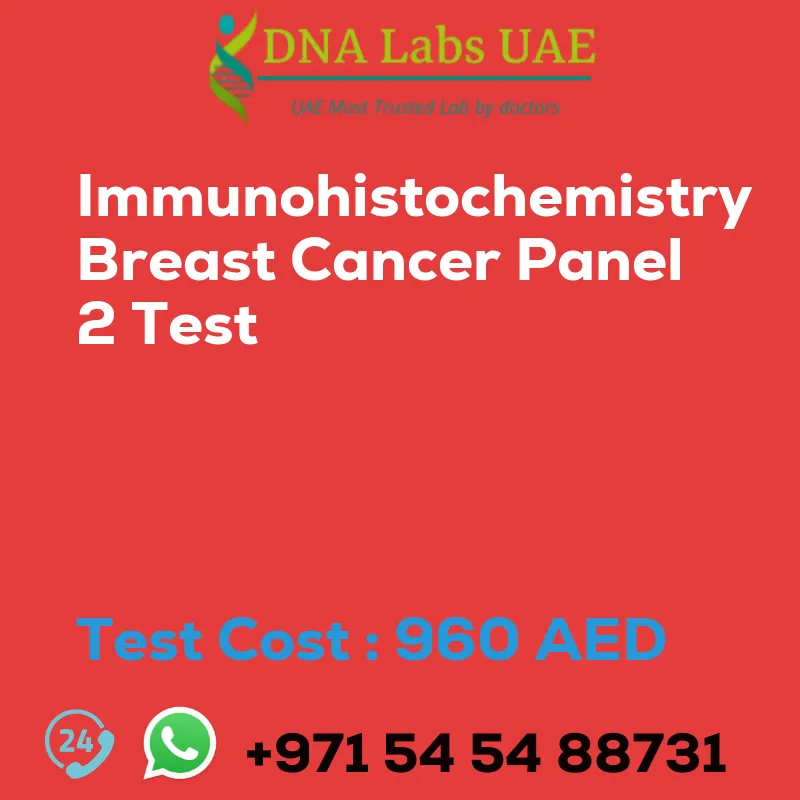IMMUNOHISTOCHEMISTRY BREAST CANCER PANEL 2 Test
Test Name: IMMUNOHISTOCHEMISTRY BREAST CANCER PANEL 2 Test
Test Components:
- ER
- PR
- Cathepsin D
- Includes pathologist review for presence of malignant cells
Price: 960.0 AED
Sample Condition: Submit tumor tissue in 10% Formal-saline or Formalin fixed paraffin embedded block. Ship at room temperature. Provide a copy of the Histopathology report, Clinical history & indicate site of biopsy.
Report Delivery:
- Sample: Daily by 6 pm
- Report – Block: 5 days
- Tissue biopsy: 5 days
- Tissue large complex: 7 days
Method: Immunohistochemistry
Test Type: Cancer
Doctor: Oncologist
Test Department: HISTOLOGY
Pre Test Information: Provide a copy of the Histopathology report, Clinical history & indicate site of biopsy.
Test Details
The IMMUNOHISTOCHEMISTRY BREAST CANCER PANEL 2 test is a diagnostic tool used to identify specific proteins or biomarkers in breast cancer tissue samples. This panel typically includes a combination of different antibodies that target markers commonly associated with breast cancer, such as estrogen receptor (ER), progesterone receptor (PR), human epidermal growth factor receptor 2 (HER2), and Ki-67.
The ER and PR markers are hormone receptors that indicate whether the cancer cells are dependent on estrogen or progesterone for growth. HER2 is a protein that promotes the growth of cancer cells and is overexpressed in about 20% of breast cancer cases. Ki-67 is a protein associated with cell proliferation and is used as a marker of tumor aggressiveness.
By analyzing the expression of these markers through immunohistochemistry, pathologists can determine the molecular subtype of breast cancer, which helps guide treatment decisions. For example, patients with ER-positive breast cancer may benefit from hormonal therapies, while those with HER2-positive breast cancer may be eligible for targeted therapies such as trastuzumab.
Overall, the IMMUNOHISTOCHEMISTRY BREAST CANCER PANEL 2 test provides important information about the molecular characteristics of breast cancer, helping clinicians tailor treatment plans to each patient’s specific needs.
| Test Name | IMMUNOHISTOCHEMISTRY BREAST CANCER PANEL 2 Test |
|---|---|
| Components | *ER*PR*Cathepsin D *Includes pathologist review for presence of malignant cells |
| Price | 960.0 AED |
| Sample Condition | Submit tumor tissue in 10% Formal-saline \nOR Formalin fixedparaffin embedded block. Ship at room temperature. Provide a copy of the Histopathology report, Clinical history & indicate site of biopsy. |
| Report Delivery | Sample Daily by 6 pm; Report – Block : 5 days Tissue biopsy : 5 days Tissue large complex : 7 days |
| Method | Immunohistochemistry |
| Test type | Cancer |
| Doctor | Oncologist |
| Test Department: | HISTOLOGY |
| Pre Test Information | Provide a copy of the Histopathology report, Clinical history & indicate site of biopsy. |
| Test Details |
The IMMUNOHISTOCHEMISTRY BREAST CANCER PANEL 2 test is a diagnostic tool used to identify specific proteins or biomarkers in breast cancer tissue samples. This panel typically includes a combination of different antibodies that target markers commonly associated with breast cancer, such as estrogen receptor (ER), progesterone receptor (PR), human epidermal growth factor receptor 2 (HER2), and Ki-67. The ER and PR markers are hormone receptors that indicate whether the cancer cells are dependent on estrogen or progesterone for growth. HER2 is a protein that promotes the growth of cancer cells and is overexpressed in about 20% of breast cancer cases. Ki-67 is a protein associated with cell proliferation and is used as a marker of tumor aggressiveness. By analyzing the expression of these markers through immunohistochemistry, pathologists can determine the molecular subtype of breast cancer, which helps guide treatment decisions. For example, patients with ER-positive breast cancer may benefit from hormonal therapies, while those with HER2-positive breast cancer may be eligible for targeted therapies such as trastuzumab. Overall, the IMMUNOHISTOCHEMISTRY BREAST CANCER PANEL 2 test provides important information about the molecular characteristics of breast cancer, helping clinicians tailor treatment plans to each patient’s specific needs. |








